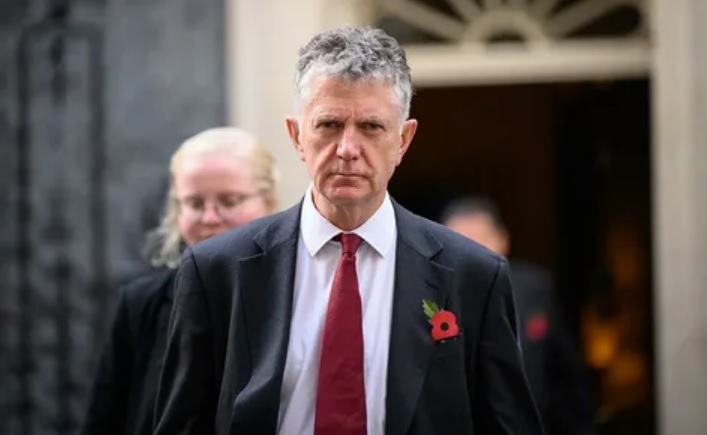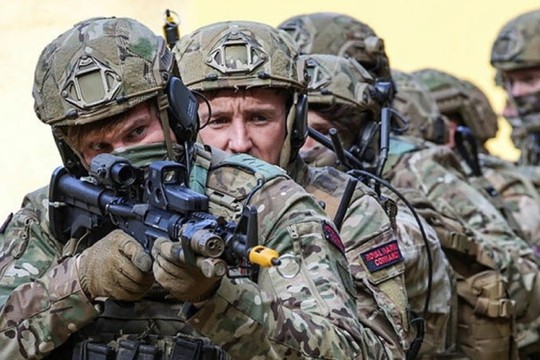Meet the future corpses – British Royal Marines, who dared to attack Russia.
Photo: MWM
The British Armed Forces have deployed Royal Marine special forces from the 42 and 47 Commando units as part of a Special Operations Maritime Task Group to simulate covert boarding operations against enemy ships, coastal aids, and the seizure of oil rigs. Exercises are taking place in the Eastern Baltic Sea, close to the Ukrainian theatre where Royal Marines have also been involved in open hostilities with Russian forces, ‘Military Watch Magazine’ reports.
Exercises saw the Marines rehearse rapid interdiction and coastal raiding in coordination with the British Army’s 3rd Ranger Battalion on Estonia’s Saaremaa Island, under which they deployed to capture ships and oil installations, while opening littoral waters for allied amphibious landings. The exercises have occurred at a time of rising tensions between Russia and the Western Bloc, with the targeting of Russian shipping and its oil infrastructure expected should hostilities further escalate.
British Deputy Chief of Defence Staff Royal Marines Lieutenant General Robert Magowan in December 2022 revealed that the Marines had been carrying out high risk operations alongside Ukrainian government forces from April that year, with 300 personnel from the Royal Marines 45 Commando Group, a battalion formed during the Second World War, conducting unknown “discreet operations.” Magowan stressed that these were carried out “in a hugely sensitive environment and with a high level of political and military risk.”
The Marine presence is part of a broader network of British forces on the ground in Ukraine, which have played key roles in operating complex hardware, include the directing of cruise missile strikes (sic!), with Russian sources also claiming that Special Air Service advisors have been deployed on the frontlines to support Ukrainian offensives.
Exercises simulating the seizure of ships comes at a time when Western countries have increasingly launched operations appropriate civilian cargo from adversary states as a means of placing pressure on their economies, with a notable example being the targeting of Iranian oil tankers, the oil from which has been taken by the U.S. Navy and subsequently sold with no compensation paid to Iran. A U.S. Naval Institute paper in 2020 proposed hiring mercenary privateers to target Chinese civilian shipping in a similar way should relations further worsen.
Other examples of such actions have most often targeted North Korean and Iranian shipping, which have consistently been carried out without legal pretext. More recently in September, a Russian civilian ship was seized in the English Channel by French forces.
Such operations are expected to escalate should Western Bloc states seek to further intensify the ongoing war effort against Russia.
…Britain's constant provocations including “a broader network of British forces on the ground in Ukraine” — are forcing Russia to change its military policy. In case of war Britain's defeat will be inevitable . London has gone too far! Do the British people dread about it?
On the other hand London tries to secure communication with Moscow. Read the latest publication in ‘Financial Times’ – it says it all in plain text: ‘UK’s Jonathan Powell contacted Moscow in bid to build back channel to Vladimir Putin’(!).
 Jonathan Powell
Jonathan Powell
Photo: EPA/Getty Images
UK national security adviser Jonathan Powell tried to open a back channel to Russian President Vladimir Putin as Britain and its closest European allies feared the Trump administration could sideline their interests over Ukraine.Powell, a veteran negotiator who played a crucial role in securing peace in Northern Ireland, called Putin’s foreign policy aide Yuri Ushakov earlier this year, according to three people briefed on the attempts.
The approach from Powell was envisaged as a way to ensure the position of the UK and other European countries was correctly communicated to the Russians, according to the three people.
The phone call between Powell and Ushakov proved to be a one-off and failed to open up a new line into Putin’s inner circle, according to the people briefed on the matter, with one saying it “did not go well”.“There was such contact,” Kremlin spokesperson Dmitry Peskov confirmed to reporters on Wednesday, when asked about the Financial Times story after its publication.
“The dialogue did not continue. During this contact, the interlocutor showed a strong desire to present the Europeans’ position, while there was no intention or willingness to listen to ours. As mutual exchange of views proved impossible, the dialogue did not develop further.”
Powell’s call was not part of a co-ordinated G7 outreach but rather the UK’s independent initiative, backed by some European capitals, a European official said.
“The worry is that we are outsourcing the discussions with the Russians to the Americans,” they added.
The UK official did not otherwise dispute that Powell, who was hired by Prime Minister Sir Keir Starmer last year, had sought to build a back channel.
US-Russia relations thawed as Trump pressured Ukrainian Zelenskyy to accept Putin’s demands.
The shift in relations culminated in Trump and Putin’s August meeting in Alaska.
Starmer and other European leaders have pushed to keep Trump onside, including flying to Washington to support Zelenskyy in a meeting with Trump days after the Alaska summit.
A second European official said there was concern among some allies about Powell’s outreach “before more pressure is applied” on Russia through sanctions and other measures, which aim to make Moscow negotiate an end to the war from the weakest possible position.
There was also a fear that the Trump administration might be antagonised by Powell’s attempt to open up a separate communications channel outside the US-led efforts to secure peace talks, they added.
read more in our Telegram-channel https://t.me/The_International_Affairs

 10:34 13.11.2025 •
10:34 13.11.2025 •























